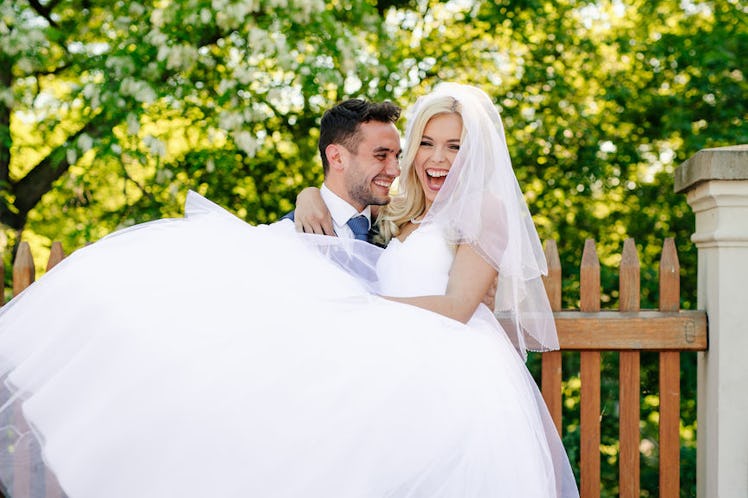
Here's What To Factor In If You're Considering A Religious Wedding, But You're Not Religious
It's easy to feel like you have to please everyone on your wedding day, but the truth is, the two people who should come first are you and your partner. This applies to everything from what cake flavor you get, to where you have your wedding ceremony. But it can get especially tricky when faith plays a role, and you don't necessarily feel a connection. This begs the question: Should you have a religious wedding if you’re not religious? Really, there's a lot to consider.
I spoke to four experts on weddings and relationships, and they all agreed on one thing: Your wedding day should be a reflection of you and your partner. "Your wedding day is about you and your partner, it makes sense to surround yourself with people and things that are meaningful to the two of you and to be in a place that speaks to you," Nicole Richardson, licensed marriage and family therapist, tells Elite Daily. "If that is not a church, then another venue may be better suited for you." However, it's not always easy to put yourselves first, especially when family is involved.
If, for example, you and your partner were raised religious, but didn't continue to practice while your families did, you may feel tempted to have a religious ceremony because you know it's important to them. And while that's totally understandable, "at the end of the day, this is about the two of you," Dr. Gary Brown, a prominent Los Angeles-based therapist who's worked with couples for over 25 years, tells Elite Daily. "Don't let family members guilt you into having your wedding in a religious setting that neither one of you wants."
On the other hand, Mandy Connor, founder of Boston-based Hummingbird Bridal and Events, suggests going through with a religious ceremony if you honestly don't have a preference, saying that "if you’re on the fence about it, but it’s important to your family, and you’re not really against it, then I would say it would be good to pay tribute to your family history." Family is definitely important, but it's your day. Ultimately, the decision is yours and your future spouse's.
Since your wedding day is yours and your partner's, both of you should make all the final decisions together. This means that if you and your partner are of different faiths, or you just can't agree on what type of ceremony you want to have, you might run into some trouble. But that doesn't mean you should agonize over this decision. "If your partner is religious and you are not, this is the first step in negotiating how you will navigate faith in your relationship," Richardson says. "What role will it play? How will you honor and respect each other's differences?" If it is important to your partner to have a religious ceremony, it's in your relationship's best interest to consider what they want and try to come to some sort of agreement that you'd both be happy with, she adds.
"In healthy partnership, we must always be looking for and finding the win-win," spiritual matchmaker Heather Kristian Strang tells Elite Daily. "And so, you and your future spouse must find a wedding venue and flow that is a true expression of your union and accurately shows who you are as a couple." When you discuss religion and how you want it to play out on your wedding day, it's important to take note of what matters to each of you. How did you always imagine your wedding? Who did you want to be there? Where did you want to have it? A happy medium for both of you to have the day you always imagined could be "to have your wedding outdoors in nature, and then be married by your spouse's primary priest/minister," Strang suggests.
In the end, your wedding day is yours and should be "an authentic expression of who you and your partner are as a couple," Strang says. If you don't want to have a religious ceremony, you don't have to. "We live in a time now where we no longer have to stay stuck in following tradition simply for tradition's sake," she adds. Connor reminds us: "Your wedding day is an opportunity to stay true to who you are." Don't let that opportunity pass you by.